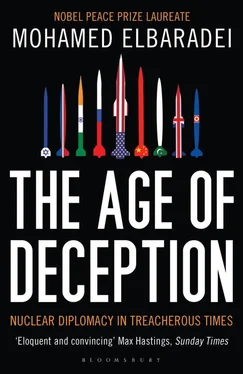Worst of all, the timing of Resolution 1696 was terrible. Its adoption coincided precisely with a raging war in Lebanon, an intense conflict between Hezbollah and the Israel Defense Forces, in which thousands of Lebanese civilians were caught in the cross fire. Despite repeated appeals from the international community, Rice, Bush, and the British had opposed calling for a cease-fire. In answer to Kofi Annan’s request that Bush and Blair support a cease-fire, they had both said, again speaking in unison, “We are not ready.”
Later, it was admitted that the United States had joined efforts to halt the violence only when it was clear that Israel’s military offensive was not working. [5] “Bolton Admits Lebanese Truce Block,” BBC News Online, March 22, 2007.
Instead of ending the fighting, the United States had rushed the delivery of precision-guided bombs to Israel. [6] David S. Cloud, “U.S. Speeds Up Bomb Delivery for the Israelis,” New York Times , July 22, 2006.
The Security Council would not pass a resolution calling for cease-fire in Lebanon until August 11; by that time, more than 1,100 Lebanese and 40 Israeli civilians had been killed and roughly 750,000 Lebanese civilians had been displaced from their homes, all while the world’s powers stood idly by.
I was in Egypt at the time, at my beach house north of Alexandria. The mood on the street was volatile. The anger across the Middle East—at the perceived double standard, at the West’s deliberate inaction—was at a fever pitch. Kofi Annan called me while I was there. His tone was despondent. “This war in Lebanon was not considered a threat to international peace and security,” he said, his voice subdued but anguished, “but the laboratory-scale activity in Iran was.”
Trying to stay focused, shortly after the passage of Security Council Resolution 1696, I had sent a message to Larijani suggesting that the Iranians answer the offer from the West, as planned, on August 22. I proposed that they state their willingness to suspend industrial-scale nuclear enrichment activities for a few years and commit to resolving outstanding verification issues with the IAEA. “If I can report progress on these two fronts,” I said, it will change “how the Europeans and others see the situation.”
Instead, Larijani sent a message back from Tehran to the West via a press conference. The Islamic Republic of Iran, he announced, would never agree to suspend its uranium enrichment activities.
Certain aspects of the passage of Resolution 1696 were a mystery to me, but part of the problem seemed to be the players behind the scenes in mid-2006.
John Sawers, a sharp diplomat and a former assistant to Blair, who spoke for the United Kingdom, took a hard line similar to the Americans. Over the past couple of years, I had observed differences in style and substance between Sawers and his boss, Foreign Secretary Jack Straw. I had developed a close relationship with Straw; in all our dealings, I found that he had an ability to grasp the big picture, a sense of fairness, a deep respect for cultural nuance, and a pragmatist’s willingness to consider commonsense solutions.
But Straw was no longer Sawers’s boss. Straw had told me, earlier in the year, that it was clear the Americans no longer trusted him. When reports had circulated alleging U.S. plans to use bunker-busting weapons in Iran, Straw had been quoted saying the idea was “completely nuts,” telling BBC News there was “no smoking gun.” [7] “UK Dismisses Talk of Iran Attack,” BBC News Online, April 9, 2006.
One month later, Blair had removed Straw as foreign secretary, replacing him with Margaret Beckett, a foreign policy neophyte. [8] Beckett had been working on climate change as the secretary of state for environment, food and rural affairs. She told the Sunday Times on June 28 that when Blair told her she was being appointed foreign secretary, her response was “one word, with four letters.”
I was told that Straw had been removed because of policy differences with Blair. I also understood that it was at the urging of the Americans but when we discussed his detractors, Straw was clear that it was “not Condi.” Straw was known to have referred to Blair’s policy during the Lebanon war as “disastrous.” But Straw’s opinion on Iran, Lebanon, and Resolution 1696 no longer mattered to Blair, and Beckett was too new to dissent.
The French foreign minister, Philippe Douste-Blazy, a physician, was also a novice in foreign affairs. I was told he was not taken seriously by the Quai d’Orsay, the French Foreign Ministry, and that the distaste was mutual. In addition, the French were going through a prepresidential election. People had begun to talk about “two Frances”—the first led by Chirac and his national security adviser, Maurice Gourdault-Montagne, and the second by the ministry residing at the Quai d’Orsay—with opposing foreign policy positions. So the French, operating in an unusual mode at the time, were not as coherent in their foreign policy as they might otherwise have been.
The Germans were the ones making an effort to find a solution and a compromise with Iran. In separate meetings with Chancellor Angela Merkel and Foreign Minister Frank-Walter Steinmeier, I found them both to be incisive, humane, and fair in their approaches to foreign policy. But the Germans did not have the clout needed to make headway without the cooperation of their European partners; they seemed happy just to be included in the negotiations.
To me the real surprise was that the Russians and the Chinese in the Security Council had agreed to adopt a resolution based on Chapter VII, despite their long-standing opposition to such an approach. They knew it could only end in confrontation and complicate any effort to reach a solution to Iran’s nuclear program, yet it seemed that their own interests had trumped these considerations.
In my view, Security Council Resolution 1696 was not only counterproductive from a policy perspective, but also a misuse of the council’s authority under Chapter VII of the UN Charter. It was staggering to compare the difference in treatment of North Korea and Iran. North Korea had walked out of the NPT and made explicit threats about developing nuclear weapons (and would in fact test its first weapon less than three months later, in October 2006), yet the Americans were ready to join them in a direct dialogue, and Chris Hill seemed to be in Pyongyang every other day. By contrast, Iran, which remained under safeguards and party to the NPT, was penalized for possibly having future intentions to develop nuclear weapons, and the Americans refused to talk to them without preconditions.
I was still in my summer house on August 20, 2006, when Frank-Walter Steinmeier called to say he would like me to meet with Peter Castenfelt, the mysterious Swedish banker who had once talked to me prior to my trip to North Korea. Castenfelt now wore a new hat: adviser to Tehran. He wanted to bring one of Larijani’s deputies, Ali Monfared, the foreign policy head of Iran’s National Security Council. They were keen to see me before Iran submitted its formal response to the latest EU-3 offer.
Meeting them in Cairo, I stressed the need for the Iranians to respond positively, despite all that had happened. Iran should be clear that it was willing to suspend moving toward industrial-scale enrichment, or at the very least promise not to introduce nuclear material. I believed that their questions about regional security were legitimate, since this was a key issue for them and addressing these concerns could facilitate an agreement on enrichment suspension. We talked for two hours; Castenfelt told me later that he spent five more hours with Monfared trying to put our discussion into appropriate written form.
Читать дальше












